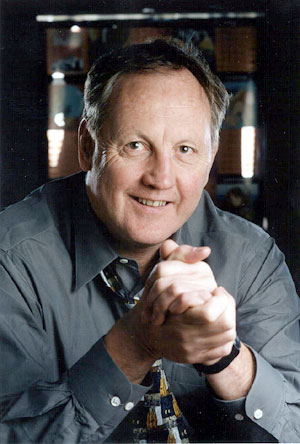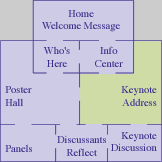 |
Michael Fullan
OISE, University of Toronto


|
Large Scale Sustainable Reform
Michael Fullan
In the audio introduction I mentioned several projects in which we are involved across three countries - Canada, the U.S. and England. All these projects are multi-year, involve integrating accountability and capacity-building and focus on student learning. They all attempt to achieve 'system change', i.e. improvements in the vast majority of schools within a given district or larger system.
We ourselves have been providing "training" to school teams and district staff on the management of change. In this keynote, I would like to describe the key components of this training, raise questions of deeper change (including sustainability) and conclude by posing some key questions.
Our training, usually 7-8 days per year over a three year period, focuses on the following modules:
- Understanding Change
- Building Professional Learning Communities - School
- Building Professional Learning Communities - District
- Leading in a Culture of Change
- Sustainability
A very brief commentary on each module, noting in advance that I refer here only to the content of each module (in the actual training, we use a variety of learning methods, including video, small group work, lecturettes, and so on).
Understanding Change
There is a difference between being an expert in the content of an innovation vs. being an expert in the change process. In other words, it is possible to be a leading expert in literacy for example, while being a disaster as a change agent in getting it implemented. In our training we teach people about the process of change - how to understand and work with 'the implementation dip', the importance of developing relationships with others not so committed to the idea, how not to get frustrated by overload and the pace of change, etc., etc. Understanding the vicissitudes of the change process is a key to working on large scale change.
We try to get people to understand the pathways problem, that is, the issue is not just what the vision looks like, but how do you get there from where you are. This is where the nitty gritty of understanding the process of change comes into play.
Above all, we conclude that change is non-linear, fragmented and disconnected. Thus, the solutions required need to be "coherence making" strategies. The rest of the modules present ideas that are indeed connectedness or coherency making.
Building of Professional Learning Communities - School
Professional Learning Communities are powerful cultures for bringing about improvement in learning at the school level. Fred Newmann and his colleagues have done the best job of describing these cultures. They found that schools that had the greatest impact on quality curriculum, assessment and student achievement had 5 core capacities:
- individual skills, knowledge and dispositions
- professional learning communities
- program coherence
- technical resources
- principal leadership
Individual knowledge by itself is not effective unless it is combined with teachers and principals working together in purposeful collaborative cultures. These cultures must address the "multiple innovations" problem by working in program coherence (prioritizing, focussing). In turn, technical resources of time, ideas and access to expertise are required. Finally, the role of the principal (or the leadership team, if you like) is to "cause" the previous four factors to get better and better over time.
In our training we work on the details of how to understand the inner working of these types of communities, and then address the more difficult question of how to create them.
Building Professional Learning Communities - District
We made the mistake of assuming that site-based management was the answer, because that was where ownership was required. Partly true, but what was missing was that you can't get large scale improvement (the vast majority of schools improving in a given district) without a proactive role on the part of the district. In other words, if large-scale reform is the goal, infrastructure matters.
Recent research on the role of the District confirms this conclusion. Elmore and Burney's case study of District 2 is a case in point. District 2, consisting of 45 schools, improved dramatically in literacy and mathematics over an 8-year period between 1988 and 1996. Elmore and Burney identify 7 themes that characterize the District:
- It is about instruction and only instruction.
- Instructional change is a long, multi-stage process.
- Shared expertise is the driver of instructional change.
- Focus on system-wide improvement.
- Good ideas come from talented people working together.
- Set clear expectations, then decentralize.
- Collegiality, caring, respect.
Several additional case studies over the past two years have confirmed that if you want large scale reform, the district must get its act together and proactively lead the process.
Leading in a Culture of Change
As we pursue large scale reform, it becomes crystal clear that the key is leadership. We cannot expect reform on any scale until there is strong leadership at many levels - principals, superintendents, teacher leaders. In my own formulation derived from studying successful examples in both business and education I drew the following conclusion. Successful leaders combine 5 core mind-action sets of competencies:
- Moral purpose
- Understanding change
- Developing relationships
- Knowledge sharing
- Coherence making
(See M. Fullan, Leading in a Culture of Change, San Francisco: Jossey-Bass.)
We are faced, then, with the daunting task of developing scores of leaders who possess the above 5 core competencies.
Sustainability
Our most recent interests have focussed on sustainability. We noticed that as literacy and mathematics scores increased (England for example has gone from 57%/54% success rates for 11 year olds in 1996 to 74%/72% success in 2001 for literacy and math, respectively), that the morale of teachers and principals if anything, was declining. We believe that there is a fundamental flaw in current approaches to reform because they address the symptoms (achievement scores) and not the underlying problem (the working conditions of teachers). The new work, thus, must tackle sustainability directly. So far we have identified four conditions of sustainability (see M. Fullan, The Principal as a Leader in a Culture of Change, Educational Leadership, May, 2002.) These four are:
- Improving the social and moral environment (of the district, for example). This involves addressing the gap between high and low performing schools in order to raise the bar and close the gap.
- Learning in context - creating schools in which teachers and principals learn on the job because the school and district has created a learning community (for us this has a very specific meaning).
- Developing leaders at many levels - not depending on charismatic leaders, but fostering a pipeline of leaders at all levels.
- Improving the working conditions of teachers and principals (reducing unnecessary overload, adding teaching assistants, etc.) - all geared to developing the learning capacity of schools and the teaching profession.
All of this is a tall order, but I believe we are on a new threshold. The next 5 years will be critical in terms of whether we transform the teaching profession by transforming the system.
As you reflect on these developments, consider the following questions:
- Do you have good examples of professional learning communities in your schools?
- Do you have good examples of professional learning communities in some school districts?
- What are the obstacles in your jurisdiction to achieving large scale reform?
- What strategies are you currently using which are experiencing some success?
- If you wanted to ask one key question about educational reform, what would it be?
|


